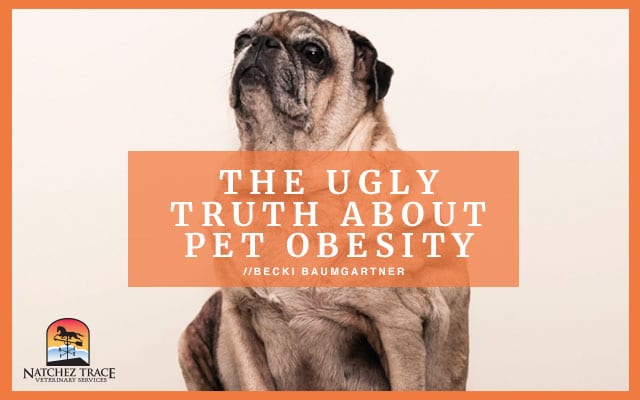If your pet carries a few extra pounds, then listen up! Pet obesity can be a health hazard.
As they say, prevention is the best cure, so a few tips from us and some dedication on your part can go a long way from having an obese pet to a fit and healthy one.
Pet Obesity Consequences
Compared to overweight pets, fitter dogs live longer and feel much better.
We all want those things for our pets. Right?
But even more, in-shape dogs suffer far fewer medical issues over a lifetime.
As medical issues arise in overweight pets, life expectancy and quality of life decrease significantly. Not something we want!
For example, overweight pets are more likely to develop:
- Diabetes
- Liver disease
- Torn or strained ligaments
- Excessive gas
- Constipation
- Arthritis
- Respiratory, heart, and skin problems.
In addition to the above risks, overweight pets suffer poor immune system function, anal gland impaction, and increased risk when under anesthesia.
And to top it off, overweight pets are at greater risk for heatstroke and slipped discs.
Many of the medical issues listed here are quite painful for your pet and your pocketbook.
What Causes Pet Obesity, and How Can I Help?
So… reduce your pet’s food intake.
Far and away, the easiest way to eliminate your pet’s obesity is through reducing his or her food intake.
Decreasing your pet’s food intake by 20-30% is easy.
Just give your pet a little over half the portion you usually feed.
You can simplify the process by spreading the daily ratio throughout the day.
It may be less stressful and more satisfying for your pet if you feed several smaller meals throughout the day rather than one or two large meals at once.
Switch Your Pet From Dry to Wet Food
Dry pet foods, no matter what kind, possess too many calories for most dogs.
In fact, most pets quickly lose excess weight when switched from a kibble-based diet to a wet food diet simply because fewer calories are consumed.
PET | TAO’s Canine Blaze Formula, based on the principles of Eastern Food Therapy, is a great example that provides energetic balance to sluggish, overweight pets.
And feeding the Blaze Formula will help your pet lose weight.
Also, many pet owners find home-cooked diets help their pets lose weight and feel better too.
Learn How to Cook for Your Pet
Increase Your Pet’s Exercise
Lack of exercise is another leading cause of obesity.
As pets age, reduced activity is widespread.
Pets often slow down because of pain and stiffness from arthritis or a general lack of energy.
Results come quickly if you cut back your pet’s food intake.
Most importantly, ensure your pet takes frequent walks or gets other forms of exercise daily.
You can expect your pet to lose 1-2 pounds per week.
Other Causes of Pet Obesity
Sometimes, pets become overweight for reasons other than overfeeding.
If you don’t see results with increased exercise and less food intake, then your pet may suffer some other health issues.
Other causes of pet obesity include:
- Lowered metabolism
- Emotional trauma
- Hormonal imbalances
Contact your veterinarian if diet and exercise don’t make a difference within a few weeks.
Your vet may do blood work to rule out thyroid or other common health issues.
If you’re interested in how we can help your overweight pet, contact us today.







